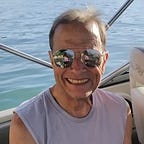How Curiosity Works
Become a leader. Ask great questions.
This isn’t about being a smartass. It’s about asking ourselves the right questions to increase understanding, perspective, wisdom and emotional intelligence.
Every great discovery and social advancement dawned when somebody asked the right question, big or small. In the process of checking out available information, he or she realized something was still missing. Following up with a question made them less gullible, and able to filter whatever they’d heard.
They could ask themselves, “Is this consistent with my experience, and of people I know?”
If not, they now had a good reason to be curious about what might have made their assumption incomplete or wrong. Facts or predictions that don’t ring true should always be questioned, regardless of what we’ve been instructed in school or the workplace.
We need never accept anything on blind faith. Having been hard-wired to want explanations, we often reassure ourselves the reasons are valid. Yet one thing that sets survivors apart from dinner in the wild is their ability to ask good questions and use them productively.
Any cave dweller who couldn’t ask good questions would be less likely to pass on his or her genes. So people got smarter.
Sparking the best answers by asking the right questions to survive leads to a desire to find explanations for everything. Then we can make sense of our world and thrive.
History’s greatest leaders and thinkers have always asked questions, skeptical of outside information. Only a society that has stopped growing discourages citizens from becoming expert questioners, and real leaders.
“The truth” is a well-propagated fantasy. Judging the validity of something that appears worth considering, being sure we’re not kidding ourselves, and supporting the right people and causes are the most we can expect from life. To find out if we’re deceiving yourselves or wrong, we must question people who disagree with us or risk disappearing down a rabbit hole.
How reliable is the source of somebody’s claim? How credible is their claim, and based on what verifiable evidence? What’s the quality of that evidence? A source quickly shows its true value after a few more questions: How does this claim compare to opposing claims? What are the people who don’t agree with it saying?
No theory should be accepted until we can prove it despite opposing theories. And only with the best questions can we verify or disprove it.
An important and elegant side benefit of asking the right questions is how they make meaningful connections and relationships more likely. Sincere questions imply a message: “I value your opinion, and hope to find ways we might work together.
And you’re open to finding common ground and possibly harmony.
We tend to present our “facts” like billboards on a highway. Passersby are much less likely to pause and reflect on billboard ads than questions.
With a bit more thought we can turn our assertion into a less aggressive question, much friendlier to “cognitive resonance.”
And introduce experts supporting your opinion as credible witnesses, not featureless foot soldiers.
The best questions grow out of sincere curiosity, fed by a willingness to be pleasantly surprised or comfortably persuaded. We might even admit the possibility that we’ve been following misconceptions or faulty assumptions. This puts us in a different category than people who shout from brick soapboxes.
Questions make us look more like searchers for truth, and less like myopic proselytizers. That’s a good shortcut on the road to becoming liked and trusted.
We are increasingly wary of getting dragged into some mysterious institution or relationship. Good questions, antithetical to dogma and rigid posturing, put us more at ease.
Heading into an historically mysterious and uncertain future, we need to become better connected, informed and trusted.
Ready to learn the art and science of asking great questions?
